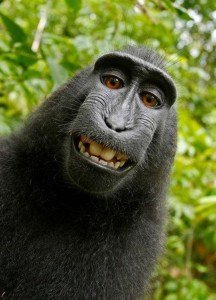“Monkey see, monkey sue is not good law—at least not in the Ninth Circuit”

I consider myself incredibly fortunate to be taking copyright this semester; it seems like 2016 is quickly shaping up to be a tumultuous year for this area of law. The year started off with controversy after the copyright to Hitler’s manifesto Mein Kampf expired on 31 December 2015. The copyright had been held since his death by the German state of Bavaria, which has not allowed the work to be republished in the country since 1945. Although other jurisdictions (and the internet) have ignored this ban, the fact that the work is entering the public domain has obviously raised some fears in Germany, and prompted a broader public debate on how to confront propaganda and censorship in the digital age.
On a much less serious note, another headline that has come out of the copyright law realm this year involves a crested macaque named Naruto. In 2011, British nature photographer David Slater travelled to Indonesia to take photographs of macaques for a book he was planning to publish. While there, the monkeys being photographed—inquisitive by nature—became interested in his equipment; eventually one grabbed his camera. According to Mr. Slater, the monkey took hundreds of photos before he was able to obtain his camera back, most of which were blurry and unusable. A couple, however, seemed to be perfect selfies of Naruto, the macaque who grabbed the camera.
The People for the Ethical Treatment of Animals (PETA) filed a claim in November 2015 saying that Naruto, having been the one who pressed the shutter on the camera and took the image, is the one who owns the copyright of the photograph. On 6 January 2016, a San Francisco court dismissed the case due to lack of standing and failure to state a claim upon which relief can be granted. In a humourous decision, the judge in Naruto v Slater began, “A monkey, an animal-rights organization and a primatologist walk into federal court to sue for infringement of the monkey’s claimed copyright.” In between quips, the judge goes on to say that although it is conceivable that an animal could have copyright over a creation, it would be up to congress or the President to change the law, who presently do not contemplate extending its protection to animals.
There is some Canadian law that may anticipate the question of whether its protections can be extended to animals. The Charter of Rights and Freedoms, for example, clearly specifies “every citizen” or “every person” before stating a number of rights. “Everyone” is a bit less clear as a moniker, but still arguably seems to refer to humans (and even corporate entities in some instances). Animal rights advocates would argue that the personhood referred to in statutes such as the Charter should be extended to animals, but as of now, it is assumed that this wording refers to humans alone. Then there are, of course, laws (mostly animal protection legislation and by-laws) that refer specifically to animals.
But what about when a statute is unclear? PETA argued that the United States Copyright Act did not contain language limiting its rights to humans, but simply “authors.” It is an interesting idea, and possibly arguable, if it wasn’t for the fact that the Copyright Office issued a policy statement in 2014 stating that works made by animals would not qualify for copyright. This statement was at least partially prompted by the monkey selfie itself, as a “photograph of a monkey” was one of the specific examples mentioned. Also mentioned was “elephants painting murals,” if anyone remembers that video making the internet rounds a couple years ago of elephants in a reserve in Thailand painting trees on a canvas. Apparently the US Copyright Office is up to date on viral animal videos.
Now that the courts have determined that Naruto the monkey does not own the copyright, Mr. Slater, who owns a British copyright of the monkey selfie (and also claims that he is now the first person to ever be sued by an animal) has stated that he plans to sue Wikipedia over its unauthorized use and republication of the image on Wikimedia Commons. Wikipedia alleges that the work is in the public domain, since no one can own the copyright to something that was created by an animal. This is likely to be a more interesting case than the somewhat facetious PETA claim, and it will be interesting to see where the legal ownership of monkey selfie—and other animal created content—ends up in the future.
